If you’ve never read The Great Gatsby you will probably enjoy the new musical version now at the Broadway Theater after a run at New Jersey’s Paper Mill Playhouse. If you have read F. Scott Fitzgerald’s classic examination of the American Dream and romantic disillusion, you will sense something missing. Book-author Kit Kerrigan’s Cliff Notes adaptation dumbs down Fitzgerald’s complex treatment of the title character’s vain search for perfection and happiness through the ostentatious display of wealth. There is pleasure to be derived from the zippy and occasionally moving score by Jason Howard (music) and Nathan Tyson (lyrics) and director Marc Bruni certainly keeps limited attention spans occupied with diverting stage effects and literal fireworks, especially during Gatsby’s lavish parties. Paul Tate DePoo III’s art deco sets and projections and Linda Cho’s stylish period costumes also dazzle. But the center of this show is empty.
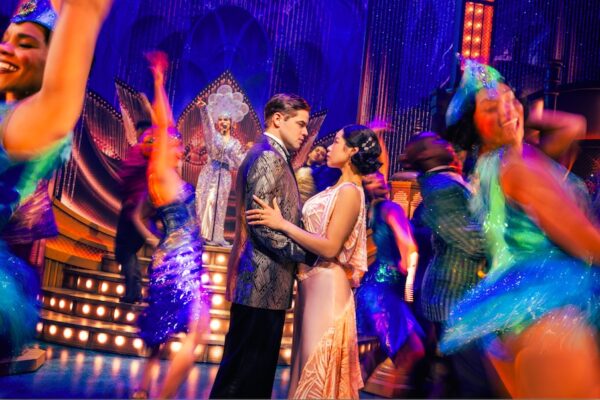
Credit: Matthew Murphy and Evan Zimmerman
There have been many adaptations of Gatsby and this classic work is open to many interpretations. There was the staid, hollow 1974 film version with Robert Redford and Mia Farrow, Baz Luhrman’s flashy, hollow 2013 remake with Leonardo DiCaprio and Carey Mulligan, Elevator Repair Service’s innovative marathon production of the entire book at the Public Theater in 2010, and an immersive production earlier this season with audience members becoming Gatsby’s party guests and wandering through a midtown hotel. These at least imparted most of Fitzgerald’s themes of loss and false values, but Kerrigan adds rom-com and musical theater elements while subtracting the original’s subtlety. (There’s even another new musical version of Gatsby set to open at ART in Massachusetts in May.)
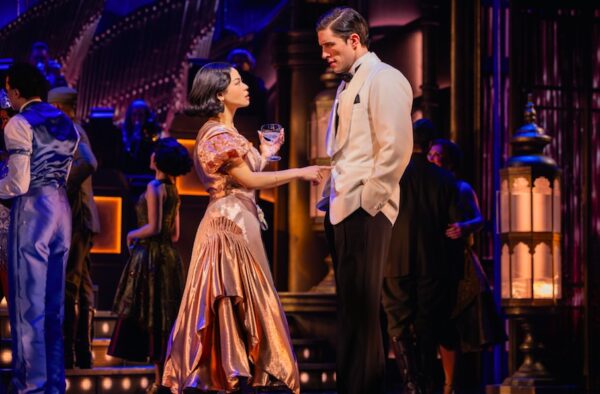
Credit: Matthew Murphy and Evan Zimmerman,
In case you did not have to read the book in high school or college American Lit, here’s a brief summary. Mysterious millionaire Jay Gatsby throws epic soirees at his Long Island mansion at the height of the Roaring ’20s. Through his tenant, Nick Caraway, a fellow World War I vet and much less well-off bond salesman, Gatsby seeks to reunite with his lost love, Daisy Buchanan (Nick’s cousin), now married to the brutish Tom who is in turn involved with the lower-class Myrtle Wilson. Myrtle is married to well-meaning but dirt-poor gas-station owner George. Tragedy ensues as each of these characters pursues their amorous and philosophical goals at the expense of the others.
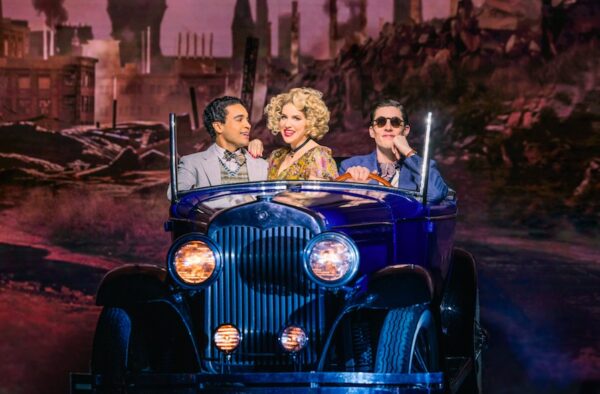
Credit: Matthew Murphy and Evan ZImmerman
Here, the central figures of Gatsby and Daisy take a back seat to Nick, who serves as narrator in the book and show, and Daisy’s friend and sounding board, the independent, marriage-phobic lady golfer Jordan Baker. Kerrigan beefs up their love story at the expense of the leads. She also turns supporting character Meyer Wolfsheim into a menacing, evil mastermind, ready to destroy Gatsby and George Wilson (a plot thread not in the novel) but not resolving Wolfsheim’s storyline. Kerrigan, Howard and Tyson also hit us over the head by explaining Fitzgerald’s metaphors. For instance, George Wilson sings about the giant optometrist’s billboard over his last station being the eyes of God rather than letting us figure it out for ourselves. The same for the green light at the end of Gatsby’s pier representing his love for Daisy.
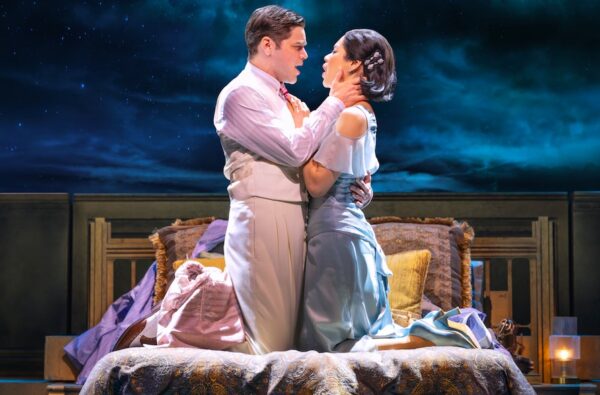
Credit: Matthew Murphy and Evan Zimmerman.
Fortunately Bruni’s direction is smooth and fast and the songs are largely enjoyable. Dominique Kelley provides some snappy choreography, particularly a peppy tap number in the second act which is entertaining and gets to showcase chorus’ considerable tap skills, but distracts from the main story.
The cast does their best to vivify these Jazz Age lost souls, but the uneven book weighs them down. Jeremy Jordan is as strong-voiced and charming as ever, but he fails to delve into Gatsby’s interior. His big solo “For Her,” expressing the protagonist’s longing for Daisy, is beautifully sung, but we don’t get the the subtext of the hero’s tragic ambitions. Eva Noblezada, who also is magnificent singer, emphasizes Daisy’s frivolous side. The strongest impression are provided by Nick (a vibrant Noah J. Ricketts) and Jordan (marvelously martini-dry understudy Dariana Mullen who filled in for Samantha Pauly at the performance attended). John Zdrojeski is a properly thuggish Tom, Sara Chase a vulgar and pathetic Myrtle, and Paul Whitty a conflicted and sympathetic George. As Wolfsheim, Eric Anderson practically twirls his mustache as a stereotypical villain, but that is probably what he was directed to do. He does have an exciting number called “Shady” explaining his criminal machinations and dog-eat-dog view of life. But that’s the trouble with this Gatsby, all flash and little substance.
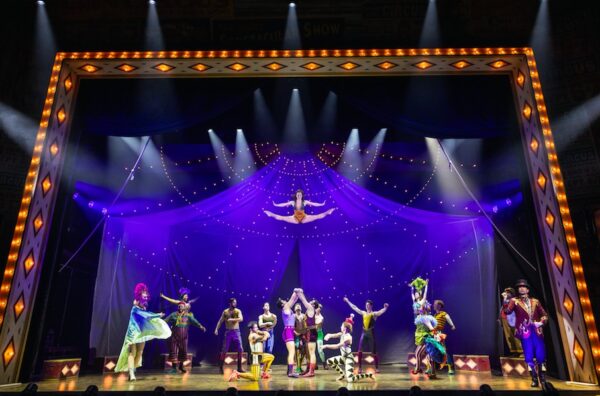
Credit: Matthew Murphy
While Gatsby takes a great book and makes into a disappointing musical, Water for Elephants takes a lesser-known novel by Sara Gruen (which served as the basis for the 2011 film) and turns it into a magnificent tuner. This fun, energetic and moving show at the Imperial is not as ambitious as Fitzgerald’s source material, but it stays true to its intent. It makes no bones about being sentimental and doesn’t condescend to the audience. Water just wants to produce water in the form of tears of sorrow and joy and it delivers. Rick Elice’s book is focused and economical while the score by the collective Pigpen Theatre Co. is varied and enchanting.
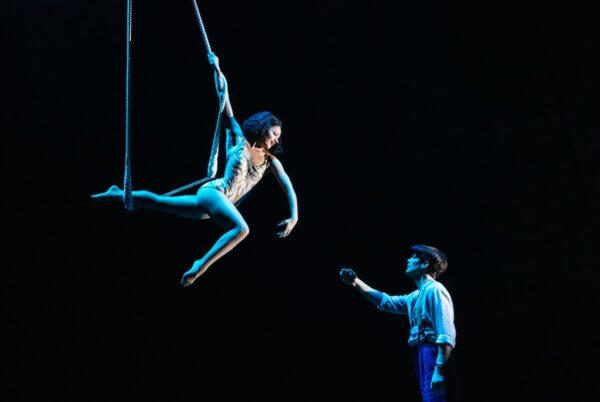
Credit: Matthew Murphy
Former circus veterinarian Mr. Jankowski (an emotionally vivid Gregg Edelman) reminisces about his youth under the Depression-era big top with a charismatic Grant Gustin playing his younger self. Isabelle McCalla is the gorgeous object of his affection and Paul Alexander Nolan her jealous ringmaster husband. Sara Gettelfinger, Stan Brown, Joe De Paul and Wade McCollum paint memorable portraits of supporting carny folk. All are splendid. But the big star here is the puppet version of Rosie, the elephant who moves the story. Ray Wetmore & JR Goodman and Camille Labarre are credited with the ingenious puppet design for Rosie and an entire miraculous menagerie.
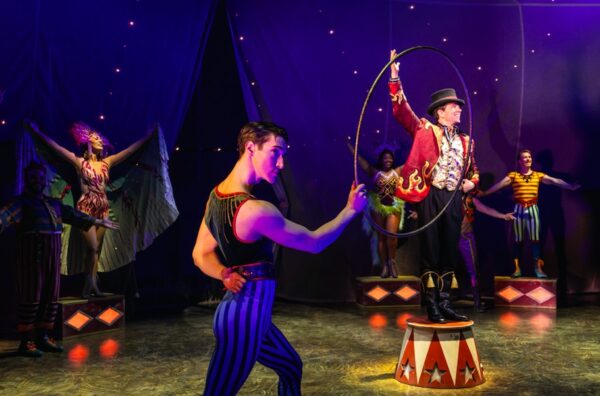
Credit: Matthew Murphy
Director Jessica Stone creates indelible stage pictures, particularly in the climactic stampede sequence (Bradley King’s magical lighting is particularly effective here. Kudos also to Takeshi Kata’s tent-and-train-oriented set and David Israel Reynoso’s splashy costumes.) Jesse Robb and Shana Carroll’s choreography advances the plot and defines character. Carroll is also listed with “circus design” which is totally wonderful. The chorus which includes numerous fantastic circus vets perform jaw-dropping, awe-inspiring feats. This is a spectacular show combining the best elements of the circus with musical theater.
The Great Gatsby: Opened April 25 for an open run. Broadway Theater, 1681 Broadway, NYC. Running time: two hours and 30 mins. including intermission. telecharge.com
Water for Elephants: Opened March 21 for an open run. Imperial Theater, 249 W. 45th St., NYC. Running time: two hours and 35 mins. including intermission. telecharge.com
